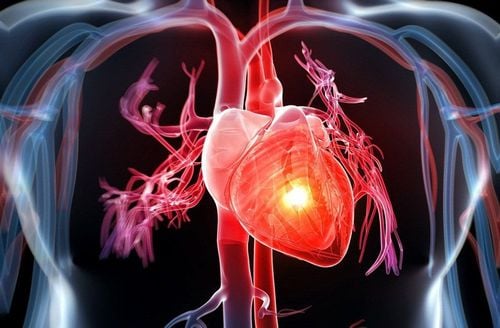This is an automatically translated article.
The article was professionally consulted by a Doctor of Cardiology - Thoracic Surgery, Vinmec Central Park International General Hospital.Pericardial effusion occurs when pericardial fluid is blocked or when there is blood in the pericardial cavity and can lead to pericarditis. If you experience persistent chest pain, difficult or painful breathing, or if you have unexplained syncope with symptoms of a pericardial effusion, you should seek medical attention. determine a timely and effective treatment regimen.
1. Pericardial effusion
Pericardial effusion is the accumulation of excess fluid in the hollow sac-like double membrane that surrounds the heart, placing pressure on the heart, reducing cardiac function. When the pericardium is damaged, local inflammation increases the amount of fluid in the pericardial cavity. In some cases, fluid can increase without inflammation, as in bleeding after chest trauma.Pericardial effusion is a common manifestation of primary pericardial disease or associated with many pathological processes of the body. The severity of the effusion depends on the underlying medical condition and the patient's potential for hemodynamic compromise. If left untreated, pericardial effusion can cause heart failure or death.
The normal pericardium has 2 layers, visceral and parietal, separated by 15 to 35 mL of fluid. Normal pericardial fluid is the plasma ultrafiltration material and is characterized by low protein concentration and low specific gravity. The parietal pericardium is an inelastic fibrous structure composed mainly of collagen that attaches to the large blood vessels and other structures of the thorax to maintain cardiac stability. This membrane also acts as a barrier to infection.
The semi-rigid properties of the pericardium inhibit cardiac filling and promote ventricular interdependence. Under normal conditions, the pericardial reserve volume exists in response to physiological changes under conditions of ventricular filling. However, if the reserve volume is exceeded, the pericardial pressure increases rapidly and significantly limits the filling of the heart.
The relatively inelastic pericardium can dilate under conditions of chronic stress such as left ventricular dilatation or a gradual build-up of pericardial effusion, although after the pressure-volume relationship The pericardial cavity reaches the nonconforming stage, the dilation capacity is limited, and small increases in volume also cause a significant increase in pericardial pressure, severely affecting ventricular filling.
Trắc nghiệm: Bạn có hiểu đúng về huyết áp cao không?
Huyết áp cao còn được gọi là kẻ giết người thầm lặng vì bệnh thường không có triệu chứng. Thiếu hụt kiến thức về huyết áp cao có thể làm cho tình trạng bệnh trở nên trầm trọng hơn. Dưới đây là những câu hỏi trắc nghiệm vui giúp bạn hiểu đúng về bệnh cao huyết áp.2. Classification of pericardial effusion
The mechanism of abnormal fluid accumulation depends on the underlying disease, but is usually due to pericardial injury and can be classified as acute or chronic, and less or less abundant. Chronic effusion is defined as effusion lasting for >3 months; and acute effusion is <3 months. The degree of effusion is determined differently. However, when the total anterior and posterior ultrasound spaces exceed 20 mm, the effusion is generally considered to be multiple.
The fluid may be serum, pus, blood, chyme, or serosa with blood, but the nature of the effusion contributes little to the specificity of the etiology. Effusion is classified as transudative or exudative. Effusion can be idiopathic, medical complications or due to infection, malignancy, trauma, cardiopulmonary disease, and autoimmune. The cause of effusion is acute or chronic pericarditis with high protein levels.
Cardiac tamponade occurs when pericardial pressure increases and limits the filling of the heart. The severity of tamponade is determined by its effect on cardiac output and hemodynamics, but even in the absence of hypotension, tamponade is a serious condition that can progress rapidly and Urgent evaluation is needed. Mild effusion and presumed to be permeable effusion are unlikely to cause significant clinical harm
Chronic pericardial effusion may present with clinical signs and symptoms similar to pericardial constriction . These two conditions may coexist, or constriction may develop as a consequence of the cause of the pericardial effusion, especially after tuberculous pericarditis or after cardiac surgery. These two conditions can be difficult to distinguish and require advanced imaging techniques.
Pericardial echocardiography is an important and irreplaceable method to accurately assess and diagnose all cases of pericardial effusion and provide clinically important information on fluid volume and volume. as the effect of pericardial fluid on the hemodynamics of the circulatory system.

Tràn dịch màng tim là gì?
3. Signs of pericardial effusion
Patients may experience typical asymptomatic pericardial effusion, especially when the volume increases slowly. In cases of symptomatic pericardial effusion, the common signs are dyspnea, especially when lying down, chest pain, usually behind the breastbone or left chest, chest heaviness, chest pain.
Symptoms of pericardial effusion can include shortness of breath, difficulty breathing when lying down (orthopnea), chest pain usually behind the breastbone or left side of the chest often feels worse when breathing and feels better on sitting up, cough, chest pain when breathing especially when inhaling or lying down, fainting or dizziness, low-grade fever, heart palpitations, feeling anxious, possible significant pericardial effusion and no pain Check for signs or symptoms if the fluid increases slowly.

Khó thở, khó thở khi nằm là dấu hiệu điển hình của tràn dịch màng tim
4. Causes of pericardial effusion
Pericardial effusion occurs when pericardial fluid is blocked or when there is blood in the pericardial cavity (from chest trauma) and can lead to pericarditis. In some cases, the cause may not be identified.Risk factors for pericardial effusion such as pericarditis after surgery or heart attack, autoimmune disease such as lupus erythematosus or rheumatoid arthritis , metastatic tumor such as lung cancer, cancer breast, melanoma, leukemia, non-Hodgkin's lymphoma or Hodgkin's disease, pericardial cancer, radiation therapy for cancer if the heart is in the radiation area (the heart is in the radiation zone), chemotherapy, toxins in the unfiltered blood from kidney failure, viruses, bacteria, fungi, parasites, closed or penetrating trauma near the heart, medicines for high blood pressure, tuberculosis, epilepsy

Trong một số trường hợp có thể không xác định được nguyên nhân gây tràn dịch màng tim
5. Complications of pericardial effusion
The pericardium can hold only a limited amount of excess fluid without causing problems. The inner layer of the pericardium is made of a layer of cells that stick to the heart. The outer layer is thicker and slightly elastic. When too much fluid builds up, the pericardium presses against the heart. When pericardial effusion puts pressure on the heart, the heart's pumping chambers do not completely fill, and one or more chambers of the heart may collapse. This condition, called tamponade, causes poor blood circulation and insufficient oxygen supply to the body. Cardiac tamponade is a life-threatening condition if left untreated.Treatment of pericardial effusion will depend on the severity of the effusion, the cause of the pericardial effusion and the potential for complications that may be encountered in the patient as well as the medical condition of the patient. core.
If you feel chest pain that lasts more than a few minutes, if breathing is difficult or painful, or if you have unexplained fainting, shortness of breath, fatigue and other symptoms of pericardial effusion, seek medical attention. to be examined, diagnosed and prescribed by a specialist in a timely and effective treatment plan.
To help patients determine the cause, complications and grade of pericardial effusion, Vinmec International Hospital now has a Cardiovascular Screening Package - Basic Cardiovascular Examination, for the following subjects: Cold limbs. ; heart palpitations; Rapidly breath; Anxiety, insomnia; Shoulder, wrist pain; Unexplained fatigue; Sweating, indigestion; Swollen feet; Frequent migraine headaches; There is a feeling of tightness when walking; Family with heart disease...
Advantages of cardiovascular screening at Vinmec International General Hospital include:
Medical team - doctors are leading experts, highly qualified , devoted and wholeheartedly for the benefit of the patient, bringing high efficiency in medical treatment; Comprehensive and professional medical examination, consultation and treatment services; A system of modern equipment, supporting effective diagnosis and treatment; Modern, civilized, luxurious and sterile medical examination and treatment space.
Please dial HOTLINE for more information or register for an appointment HERE. Download MyVinmec app to make appointments faster and to manage your bookings easily.













